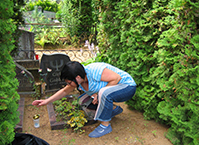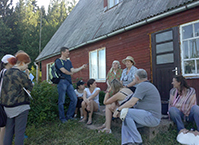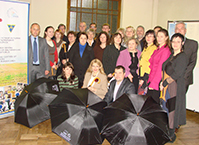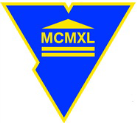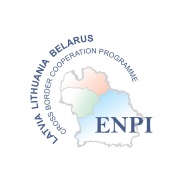E-MUSEUM “VITAMEMORIAE”: COLLECTION AND RESEARCH
Foto
To record people’s life stories, traditions, customs, rituals, rare photographs, old documents, ethnographic differences in funeral rites, etc. the researchers of Daugavpils University and Yanka Kupala Grodno State University carried out field studies in LV and BY territories: in the villages of Krāslava, Rēzekne, Daugavpils regions (Asūne, Foļvarka, Kruki, Skrudaliena, Indra, etc.) and in Belarus (Braslav and Vitebsk districts). The field studies were implemented in the framework of the project “Popularization of the Centres of Oral History in the LV – BY Cross-Border Area”, ID Nr. LLB–2–143, of the Cross Border Cooperation Programme Latvia–Lithuania–Belarus implemented within the framework of the European Neighbourhood and Partnership Instrument 2007–2013.
During the research and the expeditions, the project implementers collected, segmented, transcribed, and digitized the audio-visual materials (audio and video records, photo evidence). To make the collection of the E-Museum more complete, the field researchers and cemetery researchers of Daugavpils University and Grodno University will segment and systematize the audio-visual materials collected during oral history, cemetery research, folklore and dialectology expeditions of the previous years that until now have not been used, aiming at including the best and most valuable segments of the collection into the E-Museum.
The story tellers whose life stories make the input of the E-Museum are people of various generations, mostly elderly people. The childhood of aged people, who at present are about 80 years old, proceeded in the 1930s, therefore the segmented audio-visual units included in the E-Museum chronologically begin from 1929 and can describe only the respondents’ childhood memories. The memory of the older generation is particularly important for the anthropological and historical research – it shifts the time borders, allows for moving to the events of the past through the viewpoints of those who have experienced those times. The facts can be found in chronicles, but what the witnesses of that time can reveal give the memories colour, scent, involve one into mutual emotional experience. The witnesses of the epoch tell about the events form the viewpoint of their own experience.
To motivate the respondents to share their life stories, the project field researchers used Paul Thomson’s oral history research method – enlarged vision of social history where diverse groups of the society are brought together and share common historical experience.
The research basis is the methodology of a semi-structured interview that envisages focused (guided) reconstruction of the past events and an interviewer only helps the respondents to reconstruct the past.
The oral history collection of the E-Museum is envisaged to be used not only by specialists but also by a greatest possible range of non-specialists, therefore, departing from the academic tradition envisaging a complete script and transcript (written transcription of an audio or video record) of life stories, the project experts agreed to segment 360 most vivid, colourful, expressive, unusual, typological or extraordinary audio-visual units (photo, video and audio testimonies) – thematically complete excerpts, and to systematize them according to the thematic plan that would encompass both the historical processes of the 20th century (from the 1920s-30s) and the most essential events of an individual’s life.
ACCESSIBILITY OF THE COLLECTION
The interviews included into the collection are arranged according to the principle of historicism, anthropologism and personalia, indicating the author’s name and the interviewer’s name and surname.
-
Kirmashi
Did the fairs take place in Gnyazdzilava?
Yes, they took place near the … churches.
What holiday was that?
It was the most ... civil holiday. St Peter’s day. We had oh… lots of …
Researcher: Олег Коляго, старший преподаватель, ГрГУ им. Я. Купалы
Categories: Confessional and international relations, Fedor Karpeka
-
Ira about life in Borisov
Borisov consisted of the two cities – Old Borisov and New Borisov and there was a dam. A regular bus ran, it cost 45 kopecks, one bus ride. I was given the money for one way ride, and there was …
Researcher: Наталья Иващенко, кандидат исторических наук, ГрГУ им. Я. Купалы, Светлана Силова, кандидат исторических наук, доцент, ГрГУ им. Я. Купалы
Categories: Residence and weekdays, Ira Motolyga
-
Ira Motolyga about the family
Do you know the circumstances of the death of your father?
We did not see him. No, we even don’t have a photograph of him. We do not know him.
Did you receive coupons on behalf of your …
Researcher: Наталья Иващенко, кандидат исторических наук, ГрГУ им. Я. Купалы, Светлана Силова, кандидат исторических наук, доцент, ГрГУ им. Я. Купалы
Categories: Residence and weekdays, Ira Motolyga
-
Education in the family
And in general did you have the family principals of upbringing? How you were educated in the childhood? What were you allowed to do and what weren’t you allowed?
I do not know how we were …
Researcher: Наталья Иващенко, кандидат исторических наук, ГрГУ им. Я. Купалы, Светлана Силова, кандидат исторических наук, доцент, ГрГУ им. Я. Купалы
Categories: Family, Ira Motolyga
-
Ira Motolyga in Bashkiria
They treated us well, said my mother, but when we came, mother said, they just had haymaking, they were mowing there. And they, she said, did not know anything, she said, they were sitting in the …
Researcher: Наталья Иващенко, кандидат исторических наук, ГрГУ им. Я. Купалы, Светлана Силова, кандидат исторических наук, доцент, ГрГУ им. Я. Купалы
Categories: Mode of life, Ira Motolyga
-
Ira Motolyga In Israel
Later I learned about the programme, the programme was for those under 60 years old and I was under 60 at that time. So I left.
Weren’t you afraid?
Of what? We were a group of people.
And …
Researcher: Наталья Иващенко, кандидат исторических наук, ГрГУ им. Я. Купалы, Светлана Силова, кандидат исторических наук, доцент, ГрГУ им. Я. Купалы
Categories: Residence and weekdays, Ira Motolyga
-
Technical college in Borisov
There were just few people who entered the institute. As usual, it has been always not enough of something, sometimes it was not enough of points, or something else. My mother told me to enter the & …
Researcher: Наталья Иващенко, кандидат исторических наук, ГрГУ им. Я. Купалы, Светлана Силова, кандидат исторических наук, доцент, ГрГУ им. Я. Купалы
Categories: Study and work, Ira Motolyga
-
School in Borisov
When you went to school boys and girls studied together?
Together in the first grade. I remember these teachers, they lived in a wooden house, and there was also the school in Borisov.
Was it a …
Researcher: Наталья Иващенко, кандидат исторических наук, ГрГУ им. Я. Купалы, Светлана Силова, кандидат исторических наук, доцент, ГрГУ им. Я. Купалы
Categories: Study and work, Ira Motolyga
-
Рarents Ira Motolyga
What were the names of your mother and father?
Mother’s name was Basya Konovna Liberman. Father’s name is Shulman Davyd Aronovich.
How many children did you have in the family?
Only …
Researcher: Наталья Иващенко, кандидат исторических наук, ГрГУ им. Я. Купалы, Светлана Силова, кандидат исторических наук, доцент, ГрГУ им. Я. Купалы
Categories: Parents, Ira Motolyga
-
Perestroika
I think these years were worse than the war, I was small then. A true war began in 1992.
Why?
Why? The plant was closed down; we were about 52 and 53 years old. They pensioned us off. They gave us …
Researcher: Наталья Иващенко, кандидат исторических наук, ГрГУ им. Я. Купалы, Светлана Силова, кандидат исторических наук, доцент, ГрГУ им. Я. Купалы
Categories: Residence and weekdays, Ira Motolyga


